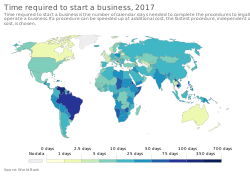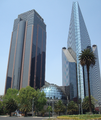The Business and Economics Portal Business is the practice of making one's living or making money by producing or buying and selling products (such as goods and services). It is also "any activity or enterprise entered into for profit." A business entity is not necessarily separate from the owner and the creditors can hold the owner liable for debts the business has acquired. The taxation system for businesses is different from that of the corporates. A business structure does not allow for corporate tax rates. The proprietor is personally taxed on all income from the business. A distinction is made in law and public offices between the term business and a company such as a corporation or cooperative. Colloquially, the terms are used interchangeably. (Full article...) Economics (/ˌɛkəˈnɒmɪks, ˌiːkə-/) is a social science that studies the production, distribution, and consumption of goods and services. Economics focuses on the behaviour and interactions of economic agents and how economies work. Microeconomics analyses what is viewed as basic elements within economies, including individual agents and markets, their interactions, and the outcomes of interactions. Individual agents may include, for example, households, firms, buyers, and sellers. Macroeconomics analyses economies as systems where production, distribution, consumption, savings, and investment expenditure interact, and factors affecting it: factors of production, such as labour, capital, land, and enterprise, inflation, economic growth, and public policies that have impact on these elements. It also seeks to analyse and describe the global economy. (Full article...) Selected articleThe economy of the Han dynasty (206 BC – 220 AD) of ancient China experienced upward and downward movements in its economic cycle, periods of economic prosperity and decline. It is normally divided into three periods: Western Han (206 BC – 9 AD), the Xin dynasty (9–23 AD), and Eastern Han (25–220 AD). The Xin regime, established by the former regent Wang Mang, formed a brief interregnum between lengthy periods of Han rule. Following the fall of Wang Mang, the Han capital was moved eastward from Chang'an to Luoyang. In consequence, historians have named the succeeding eras Western Han and Eastern Han respectively. The Han economy was defined by significant population growth, increasing urbanization, unprecedented growth of industry and trade, and government experimentation with nationalization. Another large component of the government is that it was run by influential families who had the most money. In this era, the levels of minting and circulation of coin currency grew significantly, forming the foundation of a stable monetary system. The Silk Road facilitated the establishment of trade and tributary exchanges with foreign countries across Eurasia, many of which were previously unknown to the people of ancient China. The imperial capitals of both Western Han (Chang'an) and Eastern Han (Luoyang) were among the largest cities in the world at the time, in both population and area. Here, government workshops manufactured furnishings for the palaces of the emperor and produced goods for the common people. The government oversaw the construction of roads and bridges, which facilitated official government business and encouraged commercial growth. Under Han rule, industrialists, wholesalers, and merchants—from minor shopkeepers to wealthy businessmen—could engage in a wide range of enterprises and trade in the domestic, public, and even military spheres. Selected image
Selected economyAustralia is a highly developed country with a mixed economy. As of 2023, Australia was the 13th-largest national economy by nominal GDP (gross domestic product), the 19th-largest by PPP-adjusted GDP, and was the 21st-largest goods exporter and 24th-largest goods importer. Australia took the record for the longest run of uninterrupted GDP growth in the developed world with the March 2017 financial quarter. It was the 103rd quarter and the 26th year since the country had a technical recession (two consecutive quarters of negative growth). As of June 2021, the country's GDP was estimated at $1.98 trillion. The Australian economy is dominated by its service sector, which in 2017 comprised 62.7% of the GDP and employed 78.8% of the labour force. At the height of the mining boom in 2009–10, the total value-added of the mining industry was 8.4% of GDP. Despite the recent decline in the mining sector, the Australian economy has remained resilient and stable and did not experience a recession from 1991 until 2020. Among OECD members, Australia has a highly efficient and strong social security system, which comprises roughly 25% of GDP. (Full article...) Selected quote"Repetitive labour—the doing of one thing over and over again and always in the same way—is a terrifying prospect to a certain kind of mind. It is terrifying to me. I could not possibly do the same thing day in and day out, but to other minds, perhaps I might say to the majority of minds, repetitive operations hold no terrors. In fact, to some types of mind thought is absolutely appalling. To them the ideal job is one where the creative instinct need not be expressed. The jobs where it is necessary to put in mind as well as muscle have very few takers—we always need men who like a job because it is difficult. The average worker, I am sorry to say, wants a job in which he does not have to put forth much physical exertion—above all, he wants a job in which he does not have to think. Those who have what might be called the creative type of mind and who thoroughly abhor monotony are apt to imagine that all other minds are similarly restless and therefore to extend quite unwanted sympathy to the labouring man who day in and day out performs almost exactly the same operation. When you come right down to it, most jobs are repetitive. A business man has a routine that he follows with great exactness; the work of a bank president is nearly all routine; the work of under officers and clerks in a bank is purely routine. Indeed, for most purposes and most people, it is necessary to establish something in the way of a routine and to make most motions purely repetitive—otherwise the individual will not get enough done to be able to live off his own exertions. There is no reason why any one with a creative mind should be at a monotonous job, for everywhere the need for creative men is pressing. There will never be a dearth of places for skilled people, but we have to recognize that the will to be skilled is not general. And even if the will be present, then the courage to go through with the training is absent. One cannot become skilled by mere wishing. There are far too many assumptions about what human nature ought to be and not enough research into what it is. Take the assumption that creative work can be undertaken only in the realm of vision. We speak of creative "artists" in music, painting, and the other arts. We seemingly limit the creative functions to productions that may be hung on gallery walls, or played in concert halls, or otherwise displayed where idle and fastidious people gather to admire each other's culture. But if a man wants a field for vital creative work, let him come where he is dealing with higher laws than those of sound, or line, or colour; let him come where he may deal with the laws of personality. We want artists in industrial relationship. We want masters in industrial method—both from the standpoint of the producer and the product. We want those who can mould the political, social, industrial, and moral mass into a sound and shapely whole. We have limited the creative faculty too much and have used it for too trivial ends. We want men who can create the working design for all that is right and good and desirable in our life. Good intentions plus well-thought-out working designs can be put into practice and can be made to succeed. It is possible to increase the well-being of the workingman—not by having him do less work, but by aiding him to do more. If the world will give its attention and interest and energy to the making of plans that will profit the other fellow as he is, then such plans can be established on a practical working basis. Such plans will endure—and they will be far the most profitable both in human and financial values. What this generation needs is a deep faith, a profound conviction in the practicability of righteousness, justice, and humanity in industry. If we cannot have these qualities, then we were better off without industry. Indeed, if we cannot get those qualities, the days of industry are numbered. But we can get them. We are getting them."
TopicsRelated WikiProjectsDid you know (auto-generated) -
On this day in business history
General imagesThe following are images from various business-related articles on Wikipedia.
More did you know
Business news
SubcategoriesRelated portals
Things you can doUrgent and important articles are bold
WikimediaThe following Wikimedia Foundation sister projects provide more on this subject:
SourcesDiscover Wikipedia using portals |







































